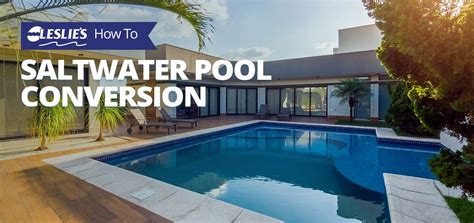The Secret to a Sparkling Saltwater Pool: Conversion Tips for Crystal-Clear Water
Saltwater pools offer the luxurious feel of a spa-like experience with less harsh chemical maintenance than traditional chlorine pools. However, achieving that perfect, sparkling water requires more than just salt. This article delves into the secrets to maintaining a pristine saltwater pool, focusing on conversion tips and best practices for achieving that crystal-clear oasis you desire.
What is a Saltwater Pool Conversion?
A saltwater pool conversion transforms an existing chlorine pool into a saltwater system. This usually involves installing a salt chlorine generator (SWG), which converts salt (NaCl) into chlorine, thereby reducing the need for manual chlorine additions. The conversion process itself involves several steps, from assessing your existing equipment to ensuring proper plumbing and electrical connections for the SWG. It's crucial to understand this before beginning. Improper conversion can lead to equipment damage and water quality issues.
Choosing the Right Salt Chlorine Generator (SWG): Key Considerations
The heart of a saltwater pool system is the SWG. Selecting the right one is paramount. Consider these factors:
- Pool Size: The SWG's output capacity must match your pool's volume. An underpowered unit will struggle to maintain proper sanitation, while an oversized one might be inefficient.
- Salt Cell Type: Different cell types offer varying lifespans and maintenance requirements. Titanium cells are generally more durable and longer-lasting.
- Features: Look for features like self-cleaning cycles, flow sensors, and error codes for easier maintenance and troubleshooting.
- Warranty: A robust warranty indicates the manufacturer's confidence in their product.
Maintaining Your Saltwater Pool: Beyond the Salt
While salt is the key ingredient, maintaining a sparkling saltwater pool requires more than just adding salt. Consistent maintenance is crucial.
Proper Water Chemistry:
Balancing your water's pH, alkalinity, and calcium hardness is vital. Regular testing with a reliable test kit is essential. Inconsistent chemical levels can lead to cloudy water, scale buildup, and corrosion of pool equipment.
Regular Cleaning:
Regular brushing and vacuuming of the pool surface and floor removes debris and prevents algae growth. Using a robotic pool cleaner can significantly reduce manual cleaning effort.
Filter Maintenance:
Cleaning or replacing your pool filter regularly is crucial. A clogged filter reduces the efficiency of your SWG and can impact water clarity.
Shock Treatment:
Even saltwater pools require occasional shock treatments, especially after heavy use or periods of inclement weather. This helps eliminate contaminants and maintain crystal-clear water.
Troubleshooting Common Saltwater Pool Problems
Even with proper maintenance, issues can arise.
Cloudy Water:
Cloudy water is often due to imbalanced water chemistry, insufficient filtration, or algae growth. Addressing the root cause, whether through chemical adjustments or filter cleaning, is necessary.
High or Low Salt Levels:
Maintaining the correct salt level is crucial for the SWG's operation. Regular testing and adjustments are necessary. Too much salt can damage equipment, while too little salt renders the SWG ineffective.
SWG Malfunction:
If your SWG isn't producing sufficient chlorine, it might require cleaning, repair, or replacement.
Is a Saltwater Pool Conversion Right for You?
A saltwater pool conversion offers many benefits, including reduced chemical handling and a softer feel on the skin. However, it involves an upfront investment in equipment and ongoing maintenance. Consider your budget, maintenance capabilities, and desired pool experience before making a decision.
Frequently Asked Questions (PAAs)
How much does a saltwater pool conversion cost?
The cost varies widely depending on pool size, existing equipment, and the cost of labor in your area. Getting multiple quotes from reputable pool professionals is recommended.
How long does a saltwater pool conversion take?
The conversion time varies depending on the complexity of the project, typically ranging from a few days to a couple of weeks.
What are the maintenance differences between a chlorine and saltwater pool?
Saltwater pools generally require less frequent manual chlorine additions, but consistent monitoring of water chemistry and regular cleaning remain crucial for both types.
How often should I clean my saltwater pool filter?
This depends on your pool usage and the type of filter. Backwashing or cleaning should be performed regularly, typically every 2-4 weeks, or as indicated by pressure gauge readings.
Can I use my existing pool pump and filter with a saltwater generator?
Often, yes, but it is important to consult with a pool professional to ensure compatibility and avoid damaging your equipment. Some pumps and filters are better suited for saltwater environments than others.
By following these conversion tips and best practices, you can unlock the secret to a sparkling saltwater pool, enjoying the benefits of a cleaner, gentler, and more luxurious swimming experience. Remember, consulting with a pool professional is crucial for a successful and safe conversion.

